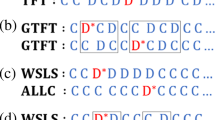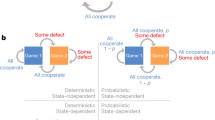Abstract
Reciprocal behavior means that recipients of harm respond in kind, that is by harming the other. We try to explain why such a behavior may be rational, although the damage cannot be prevented anymore. Our main approach is the one of evolutionary stability, i.e. we will show that mutants established with incentives to reciprocate are more effective, measured in terms of (reproductive) success. The evolutionary approach is applied to a game model whose sequential decision process allows for reciprocal behavior. We allow for complete and incomplete information about reciprocal incentives. Other ways to generalize our analysis are studied only for the case of complete information.
Similar content being viewed by others
References
Boyd R, Richerson PI (1985) Culture and the evolutionary process. University of Chicago Press, Chicago London
Cavalli Sforza LL, Feldman MW (1981) Cultural transmission and evolution: A quantitative approach. Princeton University Press, Princeton NJ
van Damme EEC (1991) Stability and perfection of Nash equilibria. Springer-Verlag, Heidelberg-Berlin-New York
Goodall J (1991) Wilde Schimpansen — Verhaltensforschung am Gombe-Strom. Reinbek
Güth W (1991) Incomplete information about reciprocal incentives — An evolutionary approach to explaining cooperative behavior. Working Paper, Stockholm School of Economics
Güth W, Yaari M (1992) Explaining reciprocal behavior in simple strategic games: An evolutionary approach. In: Explaining process and change: Approaches to evolutionary economics Witt U (ed) Michigan University Press 23–34
Harsanyi JC (1967/8) Games with incomplete information played by ‘Bayesian’ players, parts I-III. Management Science 14: 159–182, 320–334, 486–502
Kummer H (1992) Weiße Affen am Roten Meer-Das soziale Leben der Wüstenpaviane. Piper R, München
van Lawick-Goodall J (1974) In the shadow of man. Fonzana, London
Maynard Smith J (1982) Evolution and the theory of games. Cambridge University Press, Cambridge, Mass
Maynard Smith J and Price GR (1973) The logic of animal conflict. Nature 246: 15–18
Nelson R, Winter SG (1982) An evolutionary theory of economic change. Belknap Press of Harvard University Press, Cambridge, MA/London
Roth AE, Erev I (1993) Learning in extensive-form games: Experimental data and simple dynamic models in intermediate term. Working Paper, University of Pittsburgh
Selten R (1975) Reexamination of the perfectness concept for equilibrium points in extensive games. International Journal of Game Theory 4: 25–55
Selten R (1988) Evolutionary stability in extensive two-person games — Correction and further development. Mathematical Social Sciences 16: 223–266
de Waal, F (1982): Chimpanzee politics. London
de Waal F (1989) Peacemaking among primates. Harvard University Press, Cambridge/Mass
Wärneryd K (1991) Evolutionary stability in unanimity games with cheap talk. Economic Letters 36: 375–378
Weissing FJ (1991) Evolutionary stability and dynamic stability in a class of evolutionary normal form games. In: Game equilibrium models I: Evolution and game dynamics, Selten R (ed) Springer-Verlag, Berlin 29–97.
Author information
Authors and Affiliations
Additional information
I gratefully acknowledge detailed comments by two anonymous referees and financial support by the Deutsche Forschungsgemeinschaft (DFG).
Rights and permissions
About this article
Cite this article
Güth, W. An evolutionary approach to explaining cooperative behavior by reciprocal incentives. Int J Game Theory 24, 323–344 (1995). https://doi.org/10.1007/BF01243036
Received:
Revised:
Issue Date:
DOI: https://doi.org/10.1007/BF01243036




